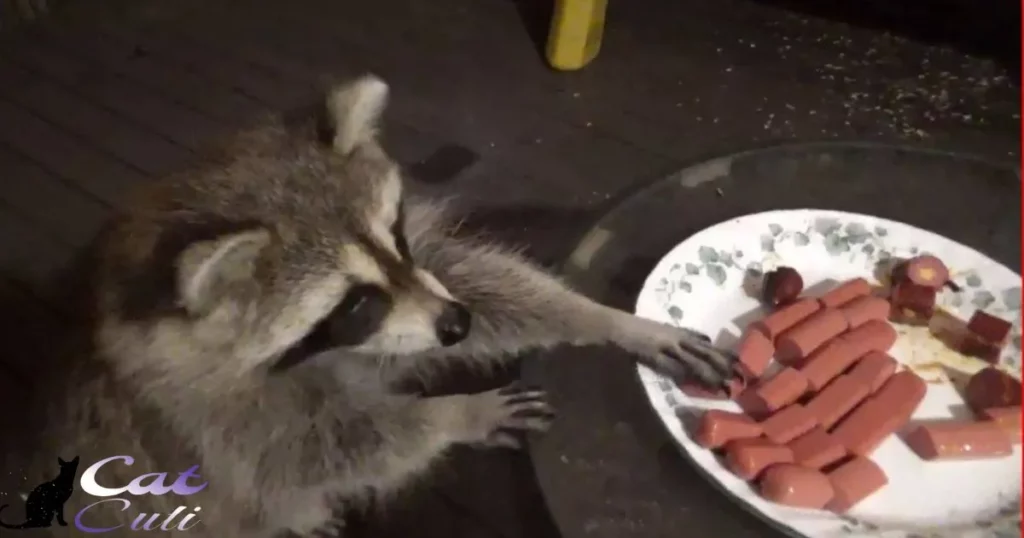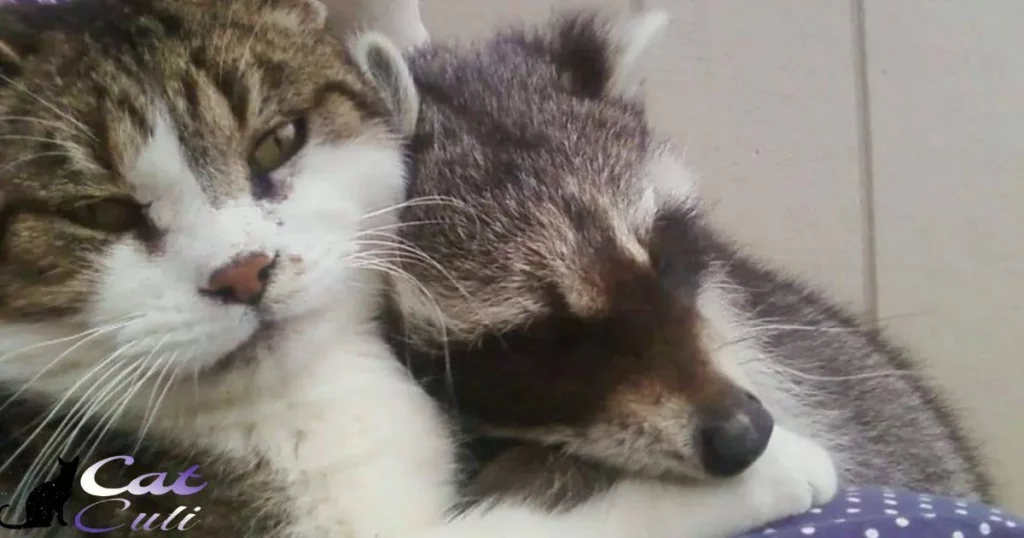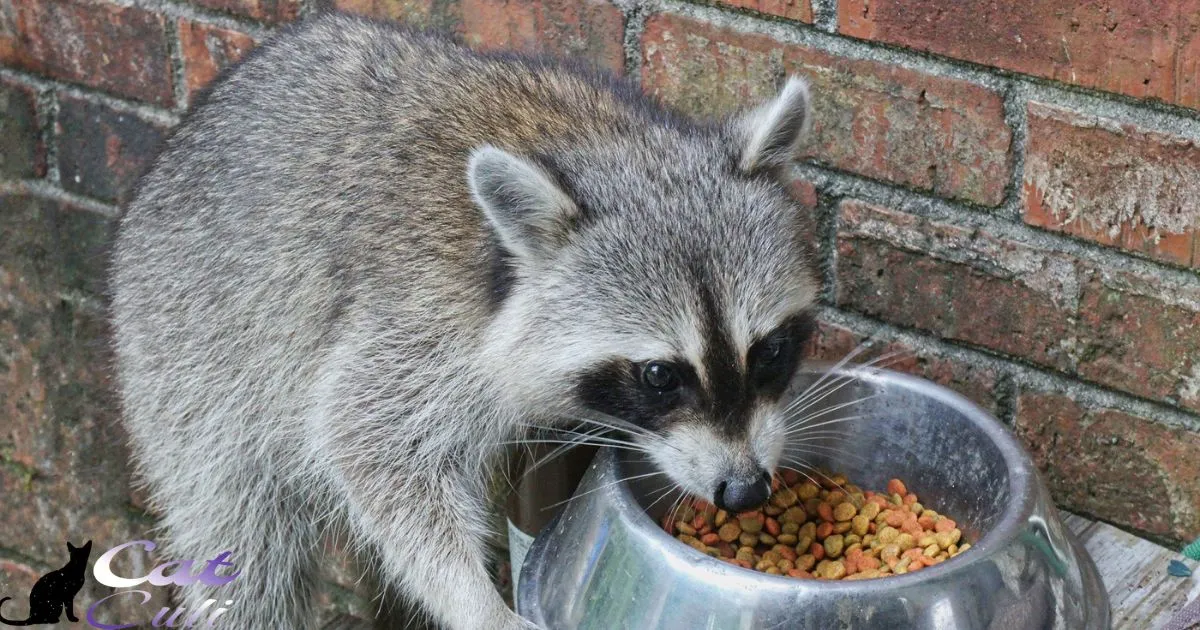To prevent raccoons from getting to cat food, keep it indoors when your cat isn’t eating. Secure lids on outdoor feeding stations. Use motion-activated lights or sprinklers near feeding areas. Regularly clean up any spilled food to avoid attracting raccoons.
From simple indoor storage tips to clever outdoor deterrents, learn the best methods to safeguard your feline’s meals while keeping pesky raccoons at bay. Explore these proven techniques and bid farewell to the hassle of raccoons invading your cat’s dinner time. How to keep raccoons away from cat food? Let’s find out.
Learn effective methods on how to keep raccoons away from cat food. Our guide provides practical tips to protect your pet’s meals from pesky raccoons, ensuring your cat eats undisturbed. Stay with us to discover simple yet reliable strategies for a raccoon-free feeding area.
The 7 Ways To Keep Raccoons Out Of Cat Food
Keeping raccoons away from your cat’s food involves seven simple methods. Store cat food indoors when not in use to prevent raccoons from accessing it easily. Secondly, use secure lids or containers for outdoor feeding stations, deterring raccoons from getting to the food.
Employing motion-activated lights or sprinklers around feeding areas can startle raccoons away. These seven ways ensure your cat’s food stays raccoon-free.
Protecting your cat’s meals from raccoons involves implementing seven effective strategies. Storing food indoors, securing outdoor feeding stations, and utilizing motion-activated deterrents are key tactics. By following these methods, you can safeguard your cat’s food and keep raccoons from disrupting mealtime.
1. Only Leave Cat Food Out During The Day
Limit access to cat food by offering it only during daylight hours, reducing the chance of attracting raccoons at night.
2. Place The Food On An Elevated Platform
Elevate the cat’s food bowl onto a platform or stand to make it harder for raccoons to reach, deterring them from accessing the food.
3. Feed Your Cat Indoors
To ensure raccoons cannot reach the food, consider feeding your cat indoors, away from potential raccoon interference.
4. Use A Raccoon-Proof Feeder
Invest in specialized raccoon-proof feeders designed to prevent raccoons from accessing the cat food, keeping it secure.
5. Fence Your Property
Erect a sturdy fence around your property to deter raccoons from entering and accessing the cat food.
6. Remove Other Food Sources
Clear your surroundings of alternative food sources that might attract raccoons, minimizing their interest in your cat’s food.
7. Speak To A Professional
Seek advice from a wildlife or pest control professional for expert guidance and additional measures to keep raccoons away from your cat’s food.
How To Keep Raccoons Out Of Cat Food
Raccoons sneaking into cat food can be a hassle, but there are simple ways to prevent it. Firstly, store cat food indoors when your feline isn’t eating. Use secure containers or elevated platforms for outdoor feeding stations. Consider installing motion-activated lights or sprinklers near feeding areas to deter raccoons effectively.
By implementing these proactive measures, you’ll create an environment that discourages raccoons from accessing your cat’s food. Keeping cat food secure and utilizing deterrents around feeding spots helps ensure your pet’s meals remain raccoon-free and undisturbed.
Hang Around While Your Friend Takes His Meal
Stay nearby while your friend enjoys their meal. Being present while they eat can provide comfort and companionship. It’s a great way to bond and show support for your friend during their mealtime. Spending time together over a meal can strengthen your friendship and create lasting memories.
Offer your company while your friend eats. Your presence can make the meal more enjoyable and sociable. Engaging in conversation or simply being there can enhance the dining experience and make it more enjoyable for both of you.
Reduce Night Meals
- Limit evening meals to promote better digestion and quality sleep.
- Consume lighter foods during dinner to avoid heavy digestion late at night.
- Opt for smaller portion sizes during dinner to reduce late-night cravings.
- Avoid heavy, spicy, or overly fatty foods close to bedtime.
- Aim for a balanced dinner to sustain energy levels without overloading the digestive system.
- Consider a cut-off time for meals to allow ample time for digestion before bedtime.
- Incorporate healthy snacks if hungry in the evening, choosing nutritious options.
Avoid Leftovers

Leftovers? Don’t leave them out! Prevent pest problems by avoiding leftovers sitting around. Dispose of excess food promptly to deter pests like ants and rodents. Keep your space clean and free from potential attractants for a pest-free environment.
To avoid unwanted critters, clear away any uneaten food promptly. Store leftovers in sealed containers to prevent pests from sneaking in. By promptly disposing of leftovers and securing food, you’ll discourage pests from making themselves at home in your surroundings.
Feed Your Cat Indoors
Keeping Possums Away From Cat Food is crucial. Feeding your cat indoors safeguards them and avoids clashes with other creatures. This practice also shields your cat from ingesting harmful substances outside. It’s a straightforward method to guarantee your cat’s safety while creating a secure eating space for your feline friend.
Indoor feeding reduces the chances of your cat encountering predators or getting into fights with neighborhood animals. It allows you to monitor their diet and ensures they consume only the food you provide. By keeping your cat indoors during meals, you create a safer and controlled space for them to enjoy their food peacefully.
Invest In A Fence
A sturdy fence is a smart investment for securing your property. It creates a barrier that deters intruders and keeps your space safe. Fences come in various materials and heights, allowing you to choose what suits your needs best. They not only enhance security but also offer privacy and define boundaries, adding value to your property.
When considering a fence, assess the purpose it serves. A fence can serve as a safety measure for children and pets, prevent trespassing, and even provide aesthetic appeal. The right fence boosts curb appeal and complements the overall look of your home, making it a practical and visually pleasing addition.
Seal Your Attic And Other Possible Outlets
| Outlet | Description |
| Attic | Ensure proper sealing to prevent critters’ entry. |
| Vents | Install mesh or covers to block animal access. |
| Chimneys | Use chimney caps to prevent wildlife intrusion. |
| Crawl spaces | Seal gaps and openings to deter animals. |
| Pipes and wiring holes | Seal around entry points with appropriate materials. |
| Windows and doors | Check for gaps and seals to prevent entry. |
Get A Raccoon-Proof Pet Feeder
Secure your pet’s meals with a raccoon-proof feeder. These feeders deter raccoons by design, keeping your pet’s food safe and accessible. Enjoy peace of mind knowing your furry friend’s meals are protected from unwanted visitors with a raccoon-proof pet feeder.
Raccoon-proof pet feeders are simple solutions to a common problem. They ensure your pet has uninterrupted access to their food while keeping pesky raccoons at bay. Invest in a reliable feeder and say goodbye to worries about raccoons accessing your pet’s meals.
Try A Magnet Locking Cat Door
Upgrade your home with a magnet locking cat door, a clever solution to control your cat’s movements while keeping unwelcome visitors out. These doors use magnets to securely lock and unlock, allowing only your feline friend access.
With easy installation and reliable functionality, a magnet locking cat door ensures your cat can come and go freely while deterring other animals from entering your home.Experience the convenience of a magnet locking cat door, granting your cat the freedom to explore outdoors without compromising your home’s security.
The magnetic locking mechanism provides a hassle-free way for your pet to enter and exit, giving you peace of mind knowing that only your furry companion can access your home through the door. Upgrade your cat’s access today with this simple yet effective solution.
Why You Should Keep Raccoons Off Your Property
Raccoons can cause damage to property and spread diseases, making it crucial to keep them away. They rummage through trash, creating messes and potentially spreading illnesses like rabies. By securing trash cans, sealing entry points, and removing attractants, you can prevent raccoons from causing havoc on your property.
Keeping raccoons away safeguards your home and helps maintain a safer, cleaner environment for everyone.These creatures can also pose a threat to pets and even humans due to their potential for carrying diseases. Raccoons may transmit diseases through bites or scratches, highlighting the importance of proactive measures to deter them.
Implementing strategies like fencing, removing food sources, and securing outdoor spaces helps protect your family, pets, and property from the risks associated with raccoons roaming your premises.
Why Are Raccoons Eating Cat Food?

Raccoons eat cat food because it’s an easily accessible food source. Their scavenging nature leads them to search for food in various places, including outdoor feeding stations meant for cats. The strong smell and easy availability of cat food make it an attractive option for these opportunistic creatures.
These masked critters are drawn to the protein-rich content found in cat food, which satisfies their dietary needs. Raccoons often roam at night, seeking out meals, and when they discover cat food, they tend to return frequently due to its palatability. Their persistent visits can create challenges for pet owners trying to maintain a raccoon-free feeding area.
Raccoon Proof Cat Feeder
Creating a raccoon-proof cat feeder is simple. Start by using elevated feeding stations or specialized feeders designed with mechanisms that deter raccoons. These feeders prevent access to raccoons, keeping your cat’s meals secure.
With these solutions, your feline friend can enjoy their food undisturbed, free from any unwelcome visitors.Raccoon-proofing your cat’s feeder involves strategic placement and clever design.
Opt for feeders with secure lids or weighted mechanisms that only open for your cat’s access. Elevating the feeder or placing it in a raccoon-inaccessible area adds an extra layer of protection. By implementing these tactics, you ensure a hassle-free dining experience for your cat.
Why Is Cat Food Bad For Raccoons
Cat food can harm raccoons because it’s high in protein and fat, which can cause digestive issues in these wild animals. Raccoons need a more varied diet to stay healthy in their natural habitat, and regularly consuming cat food can lead to obesity and nutritional deficiencies.
Feeding raccoons cat food can disrupt their natural foraging behaviours and make them reliant on an unnatural food source, affecting their overall well-being.Cat food lacks essential nutrients that wild raccoons need for a balanced diet, potentially leading to health problems over time.
Raccoons might also become more prone to diseases and conditions due to the imbalanced nutritional content in cat food, which doesn’t cater to their specific dietary requirements in the wild. Offering cat food to raccoons can ultimately be detrimental to their health and survival in their natural environment.
How To Feed Feral Cats While On Vacation
When vacationing, feeding feral cats is simple. Set up automatic feeders with enough food for their duration. These devices dispense food at scheduled times, ensuring the cats are fed consistently. Ask a trusted neighbour to assist by replenishing the food and water as needed.
Consider using dry food, as it doesn’t spoil quickly. Create a feeding schedule for the neighbour, and provide clear instructions on where to place the food. By planning ahead and utilizing automatic feeders or help from a neighbour, feeding feral cats during your vacation becomes hassle-free.
Do Cats Scare Away Raccoons
Cats can scare away raccoons due to their predatory nature. When raccoons sense the presence of a cat, they often feel threatened and opt to steer clear of the area. The sight, scent, or sound of a cat can be enough to deter raccoons from venturing close to your home.
Raccoons, generally nocturnal and cautious creatures, might avoid areas where they sense cats are active. Cats, being territorial, can inadvertently ward off raccoons simply by being around, making them a natural deterrent for these curious critters.
Raccoons And Feral Cats

Raccoons and feral cats often encounter each other in urban areas. Raccoons may compete with feral cats for food sources, leading to conflicts. They might share spaces, like abandoned buildings or urban alleys, seeking shelter and sustenance.
This interaction between raccoons and feral cats can sometimes create challenges for both species.While raccoons and feral cats might coexist in shared environments, it’s essential to manage resources to minimize potential conflicts. Providing separate feeding areas for both raccoons and feral cats can help mitigate competition for food.
Creating secure shelters or habitats tailored to each species’ needs can also reduce confrontations between raccoons and feral cats, promoting a more harmonious cohabitation in urban settings.
Raccoon Deterrent Cat Friendly
Keeping raccoons away while being cat-friendly is crucial. Use motion-activated devices near the feeding area. These gadgets startle raccoons without bothering your cat. Also, secure feeding stations with tight lids or use elevated platforms for your cat’s food.
These simple tricks create a raccoon deterrent while keeping your feline friend safe and undisturbed.A cat-friendly raccoon deterrent is vital for a peaceful coexistence. Employing natural repellents like citrus peels or vinegar around the feeding zone is effective.
Ensure there are no enticing leftovers by cleaning up spilled food promptly. By implementing these cat-safe methods, you can discourage raccoons from encroaching on your cat’s feeding space.
FAQ’s
What repels raccoons but not cats?
Ammonia-soaked rags or predator urine repel raccoons without bothering cats. Use these scents strategically.
How do you feed a feral cat without attracting raccoons?
Elevate feeding stations or use timed feeders. Secure lids tightly and clean up spills promptly.
What smell do raccoons hate?
Raccoons dislike strong odours like ammonia, pepper, or citrus. These scents deter them effectively.
How do you make a raccoon-proof cat feeder?
Install a weighted or motion-activated feeder. Elevate it and secure it tightly to prevent raccoon access.
Conclusion
In conclusion, mastering techniques on How To Keep Raccoons Away From Cat Food is essential for ensuring your feline friend’s undisturbed meals. Implementing strategies like securing feeding stations, using motion-activated devices, or employing natural deterrents helps create a raccoon-free zone while safeguarding your cat’s food.
Ultimately, prioritizing your cat’s mealtime safety by incorporating these practices ensures a harmonious feeding environment while deterring unwanted raccoon guests. Mastering How To Keep Raccoons Away From Cat Food is key to maintaining a hassle-free and secure feeding routine for your beloved pet.








